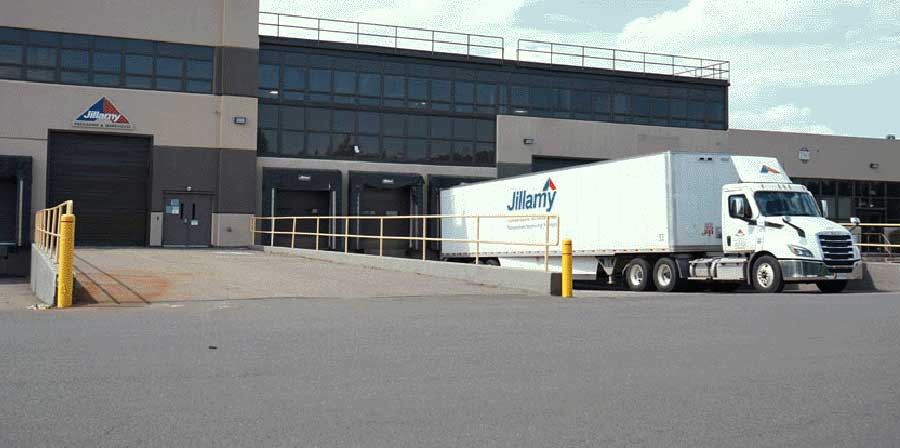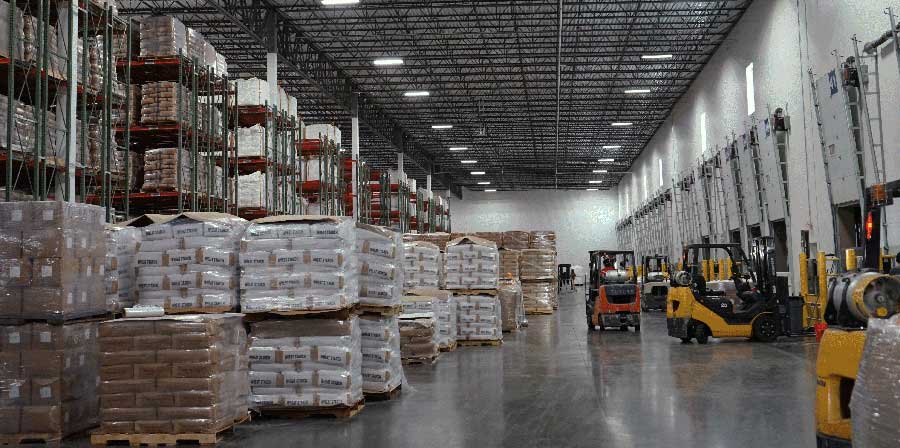Step into the evolution of Jillamy: from its humble beginnings as an Intermodal Marketing Company to its current status as a leading warehousing powerhouse in the United States. Founded in 2001 by co-owners Chris Kiefer and Ted Kuriger, Jillamy's journey reflects a commitment to innovation, excellence, and customer-centric solutions.
Drawing inspiration from their wives, Jill and Amy, Chris and Ted embarked on a mission to redefine the logistics landscape. Over two decades, Jillamy has transformed into a multifaceted organization, offering comprehensive supply chain solutions that exceed expectations.
This week, we celebrate a significant milestone: our recognition as number 56 on the Transport Topics Top 100 Dry Warehousing List. This achievement underscores our remarkable growth and solidifies our position as a formidable player in the industry.
In the world of business, efficiency is key. This is especially true when it comes to managing inventory and distribution. Warehouse services play a crucial role in this process. They ensure that goods are stored, managed, and transported effectively. From transloading to cross-docking, fulfillment to distribution, these services are the backbone of a successful supply chain.
But how do they work? And how can they help your business thrive? In this comprehensive guide, we'll delve into the world of warehouse services, exploring their many facets and benefits.
At Jillamy, we understand the importance of efficient warehouse services in driving business success. As a top-tier provider in the United States, we've honed our expertise over two decades, offering tailored solutions to meet the diverse needs of our clients. From state-of-the-art facilities to cutting-edge technology, we leverage the latest advancements to optimize inventory management and streamline distribution processes.
Join us as we unravel the complexities of warehouse services and discover how Jillamy can empower your business to reach new heights of efficiency and profitability.
Understanding Warehouse Services in the Supply Chain
Warehouse services are a vital part of the supply chain. They encompass a range of activities that facilitate the storage, handling, and transportation of goods.
These services are not just about storing products in a large building. They involve complex operations that ensure the right products are in the right place at the right time.
From receiving goods to storing them, picking orders to packing them, warehouse services ensure a smooth flow of products. They help businesses meet customer demands promptly and efficiently.
In essence, warehouse services are the glue that holds the supply chain together. They bridge the gap between production and consumption, making sure that goods reach their destination in the best possible condition.
The Role of Warehousing in Inventory Management
Warehousing plays a crucial role in inventory management. It provides a centralized location where goods can be received, stored, and dispatched. This centralization helps businesses keep track of their inventory levels and manage their stock more efficiently.
A well-managed warehouse can significantly reduce inventory costs. By optimizing storage space and implementing effective inventory control systems, businesses can avoid overstocking or understocking. This balance ensures that products are always available when needed, without tying up too much capital in excess stock.
Moreover, warehousing provides a safe and secure environment for goods. This protection is particularly important for perishable items, high-value goods, and products with specific storage requirements. By safeguarding inventory, warehousing minimizes the risk of loss, damage, and theft, thereby contributing to effective inventory management.
Transloading and Cross-Docking: Streamlining Distribution
Transloading is a warehouse service that involves transferring goods from one mode of transportation to another. For instance, goods might be moved from a truck to a train, or from a ship to a plane. This service is particularly beneficial for businesses that rely on multimodal transportation to move their products.
Cross-docking, on the other hand, is a practice where incoming goods are directly loaded onto outbound vehicles with little or no storage in between. This process reduces the need for storage space and minimizes the time goods spend in the warehouse. It's a strategy that can significantly streamline the distribution process.
Both transloading and cross-docking can enhance the efficiency of a business's supply chain. By reducing storage needs and speeding up product movement, these warehouse services can help businesses deliver their products to the market more quickly and cost-effectively.
Fulfillment Services: The Backbone of E-commerce and Retail
Fulfillment services play a crucial role in e-commerce and consumer retail industries. These services involve storing products, processing orders, packing items, and shipping them to customers. They are the backbone of any online business, ensuring that customers receive their orders accurately and on time.
In addition to basic pick, pack, and ship operations, fulfillment services may also include returns management and customer service. These added services can greatly enhance the customer experience, leading to higher customer satisfaction and loyalty.
Outsourcing fulfillment services to a warehouse company can allow businesses to focus on their core competencies, such as product development and marketing. It also provides scalability, enabling businesses to easily handle increases in order volume during peak seasons. In essence, fulfillment services are a key component of a successful e-commerce operation.
Leveraging Warehouse Technology for Efficiency
Warehouse technology has revolutionized the way warehouse services are delivered. Advanced systems and software are now used to manage inventory, track shipments, and streamline operations. This technology not only increases efficiency but also reduces the risk of errors, leading to improved accuracy and reliability.
Warehouse Management Systems (WMS), for instance, provide real-time inventory tracking and data analysis. They can automate various processes, from order picking to shipping, making operations faster and more efficient. Moreover, technologies like RFID and barcode scanning further enhance inventory management, ensuring accurate tracking of items throughout the warehouse.
Emerging technologies like AI, robotics, and IoT are also making their way into warehouses. These technologies can automate repetitive tasks, provide predictive analytics, and offer real-time monitoring of warehouse operations. By leveraging these technologies, warehouse services can be optimized for maximum efficiency and productivity.
Managing Inventory Overflow and Peak Season Challenges
Inventory overflow and peak season demands are common challenges in warehouse management. These situations require strategic planning and efficient warehouse services to ensure smooth operations and timely delivery of goods.
Inventory overflow can occur due to overstocking or unexpected increases in demand. To manage this, warehouse services employ strategies like efficient space utilization, scalable storage solutions, and advanced inventory management systems. These measures help in maintaining optimal inventory levels and preventing storage issues.
Peak seasons, on the other hand, bring about a surge in demand, putting pressure on warehouse operations. To handle this, warehouse services ramp up their resources and streamline their processes. They also leverage technology to forecast demand and plan accordingly. This proactive approach helps in managing peak season challenges effectively, ensuring customer satisfaction and business continuity.
Specialized Storage Solutions: From Food Grade to Pharmaceuticals
Warehouse services cater to a wide range of industries, each with its unique storage requirements. For businesses dealing with food products or pharmaceuticals, specialized storage solutions are crucial. These solutions ensure the safety, integrity, and compliance of the stored items.
Food-grade storage is a prime example of specialized storage. It involves maintaining specific temperature and humidity levels, ensuring cleanliness, and adhering to food safety regulations. Warehouse services with SQFI certification are preferred for food storage as they meet stringent quality and safety standards.
Similarly, pharmaceutical products require careful handling and storage. Over-the-counter pharmaceuticals, for instance, need to be stored in controlled conditions to preserve their efficacy. Warehouse services provide secure, climate-controlled storage facilities for such products, ensuring they remain safe and effective until they reach the end consumer.
The Importance of Certifications: SQFI and PLCB Approvals
Certifications like SQFI (Safe Quality Food Institute) and PLCB (Pennsylvania Liquor Control Board) approvals are crucial in the warehousing industry. They serve as a testament to a warehouse's commitment to quality, safety, and regulatory compliance.
SQFI certification is particularly important for food-grade storage, ensuring adherence to rigorous food safety standards. On the other hand, PLCB approval is essential for warehouses storing alcohol and liquor, demonstrating compliance with stringent regulations. These certifications not only enhance the credibility of warehouse services but also provide assurance to businesses about the safe and compliant handling of their products.
Outsourcing Warehouse Services: Benefits and Considerations
Outsourcing warehouse services to specialized companies can offer numerous benefits. It can lead to cost reduction, improved efficiency, and scalability. By leveraging the expertise and resources of warehouse service providers, businesses can focus more on their core operations.
However, outsourcing also comes with its own set of considerations. It's crucial to ensure that the service provider can meet the specific needs of your business. This includes the ability to handle your type of inventory, provide the necessary storage conditions, and comply with industry regulations.
Moreover, the location of the warehouse, its technology adoption, and its ability to scale as your business grows are other important factors to consider. Ultimately, the decision to outsource should be based on a thorough evaluation of the potential benefits and the suitability of the service provider.
Selecting the Right Warehouse Service Provider
Choosing the right warehouse service provider is a critical decision that can significantly impact your business operations. It's not just about finding a provider that offers the services you need, but also one that aligns with your business goals and values.
Consider factors such as the provider's experience, reputation, and the range of services they offer. Do they have the necessary certifications? Can they handle your specific type of inventory? Do they use advanced warehouse technology for efficient operations? These are all important questions to ask.
Remember, the right warehouse service provider should be a partner that helps enhance your supply chain, not just a vendor. They should be able to provide insights and solutions to improve your inventory management and distribution processes, ultimately contributing to your business growth and success.
Conclusion: Enhancing Your Business with Effective Warehouse Services from Jillamy
Warehouse services play a crucial role in the smooth operation of your business. They not only manage your inventory but also contribute to efficient distribution, cost reduction, and customer satisfaction.
Choosing the right warehouse service provider can significantly enhance your supply chain. Remember, it's not just about storage, but also about leveraging technology, managing peak season demands, and ensuring compliance with regulations. With the right partner, you can transform your warehouse operations into a strategic asset for your business.
What sets Jillamy apart is our unwavering dedication to adaptability and innovation. From domestic truckload and less-than-truckload services to international air and ocean freight, we've continually expanded our capabilities to serve our clients' evolving needs.
Our warehousing division, Jillamy Packaging & Warehouse, is a testament to our growth trajectory. With over 3.6 million square feet of warehousing space nationwide, including a substantial presence in the metro Philadelphia area, we provide the flexibility and scalability required to navigate the complexities of modern supply chains.
Driven by a customer-first approach, we've invested in state-of-the-art facilities that adhere to stringent FDA regulations and SQFI guidelines for food safety. Strategically located with seamless access to major highways, our warehouses ensure efficient distribution and optimized inventory management.
At Jillamy, we understand that success is built on trust and reliability. As we continue to expand our footprint and elevate industry standards, our commitment to excellence remains unwavering. Trust Jillamy to be your strategic partner in navigating the intricacies of modern logistics and unlocking the full potential of your supply chain. Contact us today!
--
Located in the heart of the Philadelphia region, Jillamy operates as a full-service 3PL provider, encompassing Transportation, Warehousing, Packaging, and Fulfillment services. Our network comprises 15 offices, 13 warehouses, and numerous cross-dock locations, ensuring nationwide coverage and tailored solutions to meet the dynamic demands of modern logistics.



